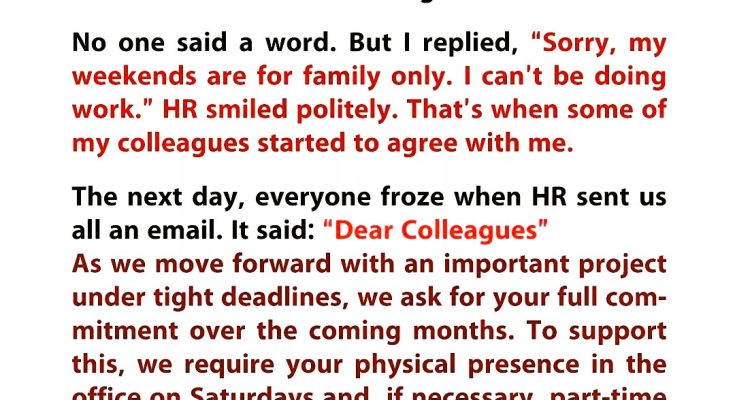I work at a design company that recently landed a high-stakes project with brutal deadlines. HR told us, “We respect your weekends, so we’ll just ask for video calls instead of coming in.” Everyone nodded silently, but I couldn’t. I replied, “Sorry, my weekends are for family. I can’t be doing work.” HR smiled, but I felt the tension. My colleagues started murmuring agreement, and for a moment, I thought I’d sparked something positive. I stood up for boundaries. I thought I’d done the right thing. But the next day, everything changed—and not in the way I expected.
An email from HR hit our inbox like a bomb. It said we were now required to physically come into the office on Saturdays—and possibly part-time Sundays. The tone was polite but firm: “To meet our goals, we need your full commitment.” I stared at the screen, stunned. My refusal to take weekend video calls had somehow triggered a harsher policy. My colleagues, who had quietly supported me, now looked at me like I’d betrayed them. I wasn’t the hero anymore. I was the reason they were losing their weekends. The shift was swift and brutal.
I became the scapegoat. People whispered behind my back. Some stopped talking to me altogether. I overheard someone say, “If she’d just kept quiet, we’d still be doing video calls.” It hurt. I hadn’t asked for this. I’d only spoken up for myself. But HR used my comment as a springboard to tighten control. I felt isolated, misunderstood, and blamed for a decision I didn’t make. The irony was cruel: I’d tried to protect my time, and now everyone’s time was being taken. I started questioning whether I should’ve just stayed silent.
But silence isn’t strength. I reminded my team, gently, that I didn’t set the policy—management did. “I only spoke up for myself,” I said. “They escalated it. That’s on them.” Some nodded, reluctantly. Others still held me responsible. I realized their anger wasn’t really about me—it was fear. Fear of HR’s power. Fear of being punished for speaking up. I wasn’t the villain. I was the mirror reflecting their own discomfort. So I decided to shift the narrative. I wasn’t going to be the lone complainer. I’d become the catalyst for something better.
I documented everything—the original exchange, the email, the reactions. If HR tried to penalize me or if resentment boiled over, I’d have proof. I wasn’t going to be scapegoated without a fight. I also started talking to colleagues one-on-one, encouraging them to raise concerns as a group. “Let’s propose flexible weekday hours instead,” I suggested. “We’re stronger together.” Slowly, the mood shifted. People saw that I wasn’t trying to ruin weekends—I was trying to protect them. The conversation turned from blame to strategy. We were no longer victims. We were collaborators.
Still, I couldn’t ignore the deeper truth: this company punishes honesty. It cloaks overwork in “team spirit” and uses fear to enforce compliance. That’s not a culture I want to grow in. So I quietly updated my resume. I started looking for companies that value boundaries, balance, and well-being. I wasn’t going to let this job define my worth. I’d use it as a stepping stone. If they don’t respect my time, they don’t deserve my talent. I’m planning my exit—not out of bitterness, but out of clarity.
I’ve learned that standing up for yourself can come at a cost—but it also reveals who’s really in control. HR didn’t change the policy because of me. They used me as a trigger to assert dominance. But I won’t let that narrative stick. I’m reframing myself—not as the villain, but as the spark. The one who dared to say no. The one who reminded others that silence isn’t safety. I may have lost some goodwill, but I gained something more powerful: self-respect. And that’s worth every awkward glance in the hallway.
So if you’re ever in my shoes, remember this: boundaries aren’t selfish. They’re necessary. And even if speaking up leads to backlash, it also opens the door to change. I’m not sorry I spoke up. I’m proud. Because in a world that demands constant availability, choosing yourself is an act of quiet rebellion. And sometimes, rebellion is exactly what a broken system needs.

